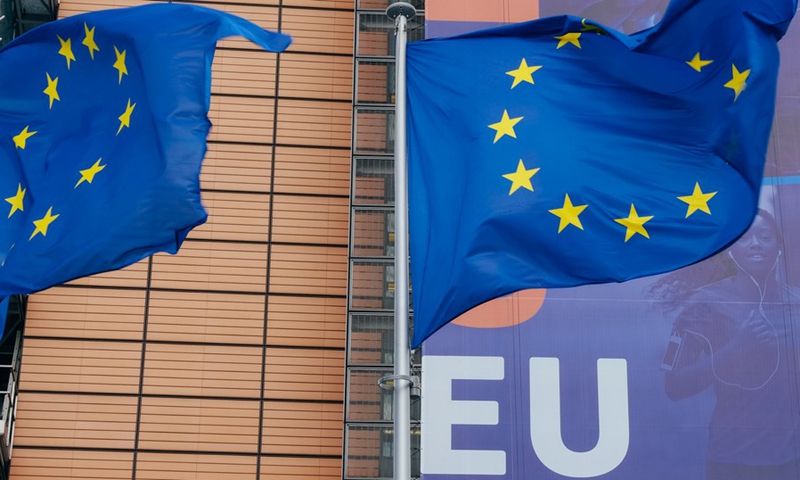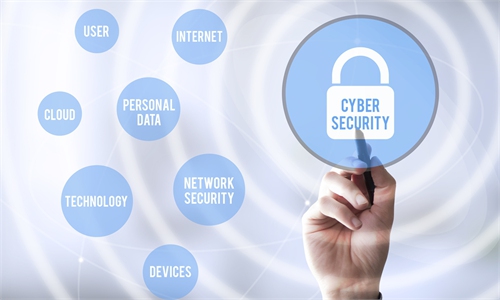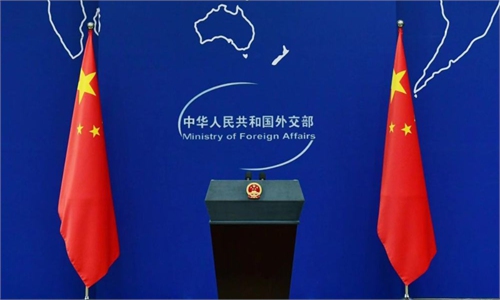Chinese FM slams EU's unjustified sanctions for allegedly 'supporting Russia,' vows to take necessary measures

Flags of the EU fly in front of the headquarters of the European Commission in Brussels, Belgium, June 29, 2020. (Photo: Xinhua)
China firmly opposes unilateral sanctions that have no basis in international law or authorization by the UN Security Council. China deplores and firmly opposes the EU's unjustified sanctions against Chinese companies, Chinese Foreign Ministry spokesperson Lin Jian stated on Tuesday, after the EU added seven Chinese companies and individuals to its sanctions list and hyped up their roles in supporting Russia in the Ukraine crisis.
On the Ukraine crisis, China is committed to promoting talks for peace. China never provides weapons to the parties to the conflict and strictly controls the export of dual-use articles, and China's scope and measures of export control over drones are the most stringent worldwide. The normal exchanges and cooperation between Chinese and Russian companies should not be disrupted or interfered with, Lin said.
Most countries, including European countries and the US, have continued to trade with Russia. We urge the EU to stop applying double standard, stop falsely accusing and shifting the blame to China, and stop undermining the lawful rights and interests of Chinese companies, Lin said, adding that China will do what is necessary to firmly defend the legitimate and lawful rights and interests of Chinese companies.
According to a statement released by the European Commission (EC), the European Council adopted its 15th sanctions package against Russia on Monday, with 84 additional listings, including 54 individuals and 30 entities, responsible for actions undermining the territorial integrity, sovereignty, and independence of Ukraine.
The EU has adopted "fully-fledged listings" (i.e. a travel ban, an asset freeze and a prohibition to make funds available) on seven Chinese persons and entities.
"Namely one individual and two entities facilitating the circumvention of EU sanctions, and four entities supplying sensitive drone components and microelectronic component to the Russian military industry in support of Russia," reads the statement.
The latest sanctions also targeted 52 new vessels from Russia's shadow fleet, increasing the total number of such listings to 79.
"China always committed to promoting peace talk, but some European politicians have always made false accusations and smeared China. We have big questions about the source of the information in Europe, about their so-called evidence," Zhao Junjie, a senior research fellow at the Institute of European Studies at the Chinese Academy of Social Sciences, told the Global Times.
A report by South China Morning Post citing the EU's new top diplomat Kaja Kallas said that "I haven't checked whether it's true, but this is what the Ukrainians are saying."
When she recently visited Ukraine, Kiev officials said China was giving Russia "the satellites that are provided for killer drones", she added.
Different from the past, the EC said in its statement that with the latest package, the EU has, for the first time, imposed "fully-fledged" sanctions (travel ban, asset freeze and prohibition to make economic resources available) on various Chinese actors.
The "fully-fledged" sanctions are sort of a "diplomatic gift" to the incoming US administration from Ursula von der Leyen, who started her second term as EC president in July, according to Zhao, noting the move harms China-EU ties.
The bloc, influenced by von der Leyen, is probably showing an attitude that Brussels will stand firm on its anti-Russia stance and "political correctness" of competing with China, even if Washington may be less supportive of Europe than it was under Biden, Zhao said.
Amid the power transit in Washington, there has also been political turmoil within European countries. On Monday, German Chancellor Olaf Scholz lost a confidence vote in parliament, triggering an early Election in February.
While in Paris, the French government still lacks a full package for its budget plan, leaving newly appointed Prime Minister Francois Bayrou to face the same challenges that ousted his predecessor, Michel Barnier, according to Euro News.
Under political and economic woes at home and strong dissatisfaction from people, some European politicians are trying to shift focus and turn the public's attention to the big power game, Zhao said.
Cui Hongjian, a professor of the Academy of Regional and Global Governance at Beijing Foreign Studies University believes that in terms of the Ukraine crisis, China and the EU can cooperate in jointly promoting peace talks, as the two sides have some consensus on safeguarding the purposes and principles of the UN Charter, avoiding a nuclear crisis and promoting humanitarian aid.
It would be better for Europe if it does not attempt to imitate US practices and unilaterally escalate the conflict with China, which is not in the real interests of Europe, the expert said.



